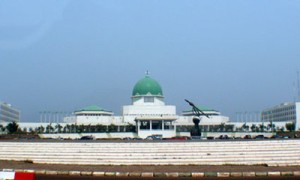
Apart from the issue of oil subsidy, no other subject has enraged and infuriated Nigerians more than the issue of the jumbo salaries and allowances of the members of the National Assembly.
Yet, in spite of the anger, the salaries and allowances are licit under the monetization policy of the government, which was implemented in 2003.
It is the monetisation policy that enabled the former Senate President David Mark to buy so cheaply the official residence of the Senate President at Apo in Abuja – a house that should be a national heritage – and get away with it.
Also, a former Speaker of the House of Representatives, Mr. Dimeji Bankole, bought the official residence of the Speaker of the House of Representatives at a giveaway price and got away with it.
If we talk about the fat salaries and allowances for the legislators, what about top civil servants who earn their pay for life and state governors who also earn their salaries and entitlements for the rest of their lives?
Once we adopt the Presidential system of government we cannot run away from its excesses and shortcomings. The jumbo salaries and allowances of the members of the National Assembly and the security votes of the state governors is also part of the excesses. They must be curbed in the light of the dwindling fortunes of the Nigeria economy.
What is monetisation? Monetisation is the quantification in money terms of those fringe benefits which government used to provide for its workers as part of their conditions of service. Such benefits include residential accommodation, chauffeur-driven cars, residential furniture, utility services, et cetera.
This policy is only practiced in Ghana, Cameroun and other African countries. I understand that Ghana stopped the policy in the last two months.
The proposal came from the Revenue Mobilisation, Allocation and Fiscal Commission. It was debated in the National Assembly and passed into law as ‘Certain Political, Public and Judicial office Holders(Salaries and Allowances etc) Act 2002. Monetisation was clamoured for by civil servants, as conveyed in the Communiqué of the Re-orientation Workshop for Directorate Level Officers in the Federal Civil Service read to the President, Olusegun Obasanjo on January 14, 2002.
The organised private sector and a number of government agencies and parastatals, including the Central Bank of Nigeria and the Nigeria National Petroleum Corporation, have adopted the monetisation of benefits for quite some time now. Also the university system has its own list monetised fringe benefits and allowances.
In other to ensure effective implementation of the policy, the Presidential Committee on the monetization of fringe benefits in the public service of the federation was set up by President Obasanjo on November 11, 2002 under the leadership of the then Secretary to the Government of the Federation, Chief UfottEkaette.
Following the submission of the Committee’s Interim Report to the then President Olusegun Obasanjo and its subsequent adoption by government, a circular detailing the newly monetised fringe benefits and the modalities for their implementation was issued on June 27, 2003, with July 1, 2003 as the commencement date of the programme.
To sensitise the States on the implementation of the Programme, an interactive session was earlier organized on Tuesday 17th June, 2003 to enable both the Head of Civil Service of the Federation to intimate Secretaries to State Governments and Head of Civil Service of the States in the 36 states of the federation with modalities for the implementation of the monetisation policy. Suffice it to say that the states objected to the implementation insisting that they could not afford it.
On November 27, 2003, Ekaette told members of the Faculty of Social Sciences, University of Lagos under the headship of Professor Lai Olurode that monetisation as a public policy reform must be “appreciated in the context of other reforms, each of which plays complementary roles with the new overarching economic development strategy of the Obasanjo Administration called the National Economic Empowerment Development Strategy.”
At the time of his departure from office in 2007, Obasanjo was shocked to find out the magnitude of the monetisation of the legislators and the salaries they were to earn. He refused to sign the bill, leaving it for President UmaruYar’adua who signed it eventually in other to please the legislators. That is where we are now. The monetisation policy, a policy that was meant to solve problems, has now created more problems for the country. It is like a monster now. The question now is, can we afford the monetization policy? The answer is no. It will be unfair to talk about the jumbo salaries and allowances of legislators as a result of monetization policy in isolation without talking about other public officers benefitting from this policy. Cutting salaries by half as announced by President MuhammaduBuhari and his vice, YomiOsinbajo is a good step. I doubt whether members of the National Assembly will follow the President’s example no matter the pressure. In fact they will tell the President that they have not come to Abuja merely to pass bills or endorse unworkable resolutionsonly.
As for these members of the National Assembly and other public officers benefitting from the monetization policy, National Sacrifice has to wait.
All that the President should do is to call a meeting of the stakeholders including governors, legislators, Nigerian Labour Congress, public discussants, religious leaders, market women and other bodies and insist that the Federal Government can no longer sustain the monetization policy of 2003.
In the interim, President Buhari should withdraw the circular on monetisation. If possible, he should ignite a National debate on the issue, after all. he is our moral guide.
PUNCH
END

Be the first to comment